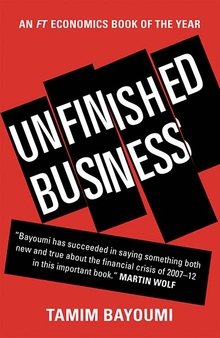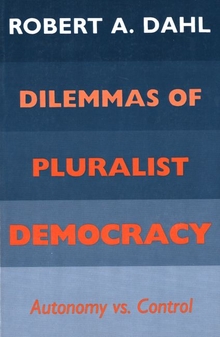Unfinished Business
WARNING
You are viewing an older version of the Yalebooks website. Please visit out new website with more updated information and a better user experience: https://www.yalebooks.com
The Unexplored Causes of the Financial Crisis and the Lessons Yet to be Learned
Tamim Bayoumi
A penetrating critique tracing how under-regulated trading between European and U.S. banks led to the 2008 financial crisis—with a prescription for preventing another meltdown
There have been numerous books examining the 2008 financial crisis from either a U.S. or European perspective. Tamim Bayoumi is the first to explain how the Euro crisis and U.S. housing crash were, in fact, parasitically intertwined.
Starting in the 1980s, Bayoumi outlines the cumulative policy errors that undermined the stability of both the European and U.S. financial sectors, highlighting the catalytic role played by European mega banks that exploited lax regulation to expand into the U.S. market and financed unsustainable bubbles on both continents. U.S. banks increasingly sold sub-par loans to under-regulated European and U.S. shadow banks and, when the bubbles burst, the losses whipsawed back to the core of the European banking system. A much-needed, fresh look at the origins of the crisis, Bayoumi’s analysis concludes that policy makers are ignorant of what still needs to be done both to complete the cleanup and to prevent future crises.
There have been numerous books examining the 2008 financial crisis from either a U.S. or European perspective. Tamim Bayoumi is the first to explain how the Euro crisis and U.S. housing crash were, in fact, parasitically intertwined.
Starting in the 1980s, Bayoumi outlines the cumulative policy errors that undermined the stability of both the European and U.S. financial sectors, highlighting the catalytic role played by European mega banks that exploited lax regulation to expand into the U.S. market and financed unsustainable bubbles on both continents. U.S. banks increasingly sold sub-par loans to under-regulated European and U.S. shadow banks and, when the bubbles burst, the losses whipsawed back to the core of the European banking system. A much-needed, fresh look at the origins of the crisis, Bayoumi’s analysis concludes that policy makers are ignorant of what still needs to be done both to complete the cleanup and to prevent future crises.
Tamim Bayoumi is deputy director in the strategy, policy, and review department at the IMF. He wrote this book while he was a senior fellow at the Peterson Institute for International Economics. He lives in Washington, DC.
"While much has been written on the U.S. Subprime Crisis and the European Debt Crisis, Tamim Bayoumi's important book is the first to show that the two crises were of a piece. Both stemmed from the influence of a powerful anti-regulatory lobby in the United States, exported to Europe via the Basel Committee on Banking Supervision. And neither crisis would have been as grave and costly absent its interaction with the other. Bayoumi's encompassing view reminds us that the problem is far from fully solved, and that now is not the time for regulators and policy makers to relax."—Barry Eichengreen, George C. Pardee and Helen N. Pardee Professor of Economics and Political Science, Berkeley, University of California.
"Tamim Bayoumi’s Unfinished Business is an important corrective to much of the received wisdom coming out of the North Atlantic Financial Crisis. Bayoumi convincingly argues that intellectually blinkered and politically driven policy decisions long before 2007 set up the crisis – notably in European bank practices. This root cause is all too often overlooked in the rampant but shallow arguments that blame the bubble and bust on monetary ease, savings gluts, or Minsky moments. It also gives more hope for future crisis prevention, and thus a policy agenda to finish."—Adam S. Posen, President of the Peterson Institute for International Economics
"Tamim Bayoumi, one of the International Monetary Fund's most respected economists, has achieved something I would not have thought possible. He has written a book on the "North Atlantic Financial Crisis" that is both original and persuasive. In particular, he explains how the failings of the European currency union led to a surge in lending by banks in the euro area's core that drove destabilizing property-related booms in both the US and the euro area's periphery. This book demonstrates that we need to learn more lessons from this devastating crisis."—Martin Wolf, chief economics commentator at the Financial Times
"Tam Bayoumi has brought off the near-impossible – telling us something new about the financial crisis. By illuminating the episodes of the past decade from the viewpoint of monetary finance, one of the IMF’s most seasoned practitioner-economists has provided a fresh way of assessing what went on –and how the world can avoid a repetition."—David Marsh, Managing Director, OMFIF and co-author of Six Days in September – How Britain lost the reserves and saved the economy
"Tamim Bayoumi has written a deeply researched history of the 2008 North Atlantic crisis, explaining how regulatory decisions and intellectual blind spots entwined the US and Europe in a single financial meltdown. Essential reading for those seeking to understand where are have been and where we are going."—Christine Lagarde, Managing Director, International Monetary Fund.
“The healthiest impact from Unfinished Business, Tamim Bayoumi’s well-written polemic, could be to give [the financial crisis] a new name. For him, this was the north Atlantic financial crisis. Created jointly in the US and western Europe, it also had its worst effects in these areas.”—John Authers, Financial Times
“A worthwhile and occasionally bracing analysis of all that went wrong, of the terrible cost and of all that remains to be done.”—Paschal Donohoe, Irish Minister for Finance, Irish Times
“Bayoumi's impressive coverage of both sides of the Atlantic sheds new light on the crisis.”—Library Journal
“Do we need yet another book on the financial crisis? For those who take banking regulation in the European Union and the United States seriously, the answer is yes.”—Investing.com
“Bayoumi’s very useful history features villains but also heroes: the recessions produced by the crises could have been a lot worse if, for example, governments had not opted for fiscal and monetary stimulus.”—Foreign Affairs
“Bayoumi . . . provides excellent insights into how this led to the crisis, especially in terms of the different economic philosophies competing for influence.”—Choice
“Bayoumi has succeeded in saying something both new and true about the financial crisis of 2007-12 in this important book.”—Martin Wolf, Books of the Year 2017: Economics, Financial Times
ISBN: 9780300238693
Publication Date: September 4, 2018
Publication Date: September 4, 2018
296 pages, 5 x 7 3/4
54 b/w figs.
54 b/w figs.








